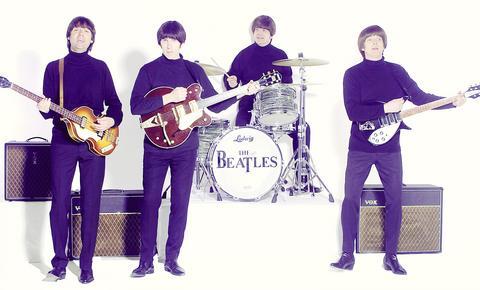As is their style, the British Chamber of Commerce is going all out for this year's Britannia Ball to be held tomorrow evening at the Grand Hyatt Taipei. NT$3,900 of real money will put you front and center for a concert by the Fake Beatles.
"What makes our ball stand out is that we really love to have fun," said Lee Ting (丁勵), executive director of the British Chamber of Commerce in Taipei. "In order to do that, we make it a point to introduce a British theme. This year's is "The Swinging Sixties." We've invited the fake Beatles and everyone is encouraged to dress the part in their favorite 60s outfit."
The band surely will be. Not only do they sound like the real Fab Four, they look like them too in their Chesterfield suits, mop-top haircuts and authentic instruments. They even boast a "left-handed Paul" and a "singing Ringo."

PHOTO COURTESY OF THE ARTISTS
"Absolutely superb!" wrote Marie Varnava on the band's online guestbook after seeing them play at the Charlemont Social Club. "Everyone got totally caught up in the nostalgia. ? It was just like being there. In a word, FAB!!"
They'll be performing all the great Beatles numbers from 1962 to 1966, which they regard as the Beatles' "best years."
Your entry fee to this year's ball will include a champagne reception, five-course gourmet dinner, a selection of red and white wines and whiskeys, and prizes for the table voted "best dressed" apropos the 1960s theme.
"Last year's theme was 007 and we had a table of people that came dressed in SCUBA gear with tuxedos underneath," Ting said. "It was so hot that we had to vote quickly so they could take off their suits."
Ting stressed that the ball is not a walk-in event and that a limited number of seats are still available for anyone who calls the Chamber this afternoon. The British Chamber of Commerce can be reached at (02) 2356 0210. The Britannia Ball will be held from 6:30pm to 2am on the third floor ballroom of the Grand Hyatt Taipei, located at 2 Songshou Rd, Taipei (北市 松壽路二號三樓).
A real interview with the fake ringo starr
Taipei Times: How did you come to be the Fake Beatles?
Fake Ringo: We're just Beatles fanatics, really. We've all been in various 60s-styled bands before. Really it was the Beatles that brought us all together.
TT: So as a child growing up in England you heard the Beatles and said to yourself, `I want to be the fake Ringo Starr?'
Fake Ringo: Very much so. One of the first records I ever heard was the Beatles' song She Loves You. That was always my favorite song.
TT: And that made you want to take up drumming?
Fake Ringo: Very much so. My first recollection of drumming was at about the age of eight. I was such a big fan of the Beatles and of drummers over the years.
TT: But were you an especially big fan of Ringo?
Fake Ringo: Yeah, very much so.
TT: You're an authentic "singing Ringo." Do you sing like Ringo?
Fake Ringo: Very much ? Well, actually, Ringo didn't have a particularly good voice, so ? er ? that helps me out to be honest.
TT: Why not perform some of the later hits?
Ringo Starr: Most people regard the Beatles' best years as between 1962 and 1966. ? It was after 1966 that the they retired to the studio before the Sergeant Pepper era. It's really a hard sound to recreate on the stage.
TT: And the drugs are hard to afford on a fake Beatles salary?
Fake Ringo: Very much so.

The primaries for this year’s nine-in-one local elections in November began early in this election cycle, starting last autumn. The local press has been full of tales of intrigue, betrayal, infighting and drama going back to the summer of 2024. This is not widely covered in the English-language press, and the nine-in-one elections are not well understood. The nine-in-one elections refer to the nine levels of local governments that go to the ballot, from the neighborhood and village borough chief level on up to the city mayor and county commissioner level. The main focus is on the 22 special municipality

The People’s Republic of China (PRC) invaded Vietnam in 1979, following a year of increasingly tense relations between the two states. Beijing viewed Vietnam’s close relations with Soviet Russia as a threat. One of the pretexts it used was the alleged mistreatment of the ethnic Chinese in Vietnam. Tension between the ethnic Chinese and governments in Vietnam had been ongoing for decades. The French used to play off the Vietnamese against the Chinese as a divide-and-rule strategy. The Saigon government in 1956 compelled all Vietnam-born Chinese to adopt Vietnamese citizenship. It also banned them from 11 trades they had previously

Hsu Pu-liao (許不了) never lived to see the premiere of his most successful film, The Clown and the Swan (小丑與天鵝, 1985). The movie, which starred Hsu, the “Taiwanese Charlie Chaplin,” outgrossed Jackie Chan’s Heart of Dragon (龍的心), earning NT$9.2 million at the local box office. Forty years after its premiere, the film has become the Taiwan Film and Audiovisual Institute’s (TFAI) 100th restoration. “It is the only one of Hsu’s films whose original negative survived,” says director Kevin Chu (朱延平), one of Taiwan’s most commercially successful

Jan. 12 to Jan. 18 At the start of an Indigenous heritage tour of Beitou District (北投) in Taipei, I was handed a sheet of paper titled Ritual Song for the Various Peoples of Tamsui (淡水各社祭祀歌). The lyrics were in Chinese with no literal meaning, accompanied by romanized pronunciation that sounded closer to Hoklo (commonly known as Taiwanese) than any Indigenous language. The translation explained that the song offered food and drink to one’s ancestors and wished for a bountiful harvest and deer hunting season. The program moved through sites related to the Ketagalan, a collective term for the